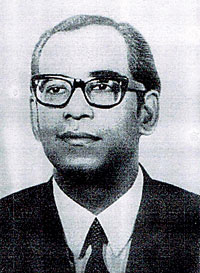Sunday Times 2
Multifaceted works of father of Sri Lanka’s post-graduate medicinal studies
To begin at the very beginning, Don Robert Seneviratne, qualified as a doctor in the Ceylon Medical College in 1887, married Laura Gunawardene and raised three children — Irangani, Keerthi Nissanka and Nihal.
 Irangani married Engineer Athukorala, nurtured children, including a first class engineer who specialised in Artificial Intelligence. Keerthi Nissanka blossomed into the most distinguished physiologist Sri Lanka has produced up to date. Nihal graduated in law and functioned for many years as the illustrious Clerk of the House of Representatives (i.e. the parliament).
Irangani married Engineer Athukorala, nurtured children, including a first class engineer who specialised in Artificial Intelligence. Keerthi Nissanka blossomed into the most distinguished physiologist Sri Lanka has produced up to date. Nihal graduated in law and functioned for many years as the illustrious Clerk of the House of Representatives (i.e. the parliament).
In an era when even brothers and sisters are prone to compete fiercely, Irangani, Keerthi Nissanka and Nihal were model siblings. Through the munificence of the family, especially amiable Nihal Seneviratne, the Physiological Society has been able to celebrate and rejoice in the memory of Keerthi Nissanka Seneviratne for 31 unbroken years.
Life and Work
There is indeed much to celebrate in the life and work of the splendored personality and the multifaceted work of Prof. K N Seneviratne — doctor, physiologist, scientist, educationist and administrator. I had the privilege of being his colleague in the Colombo Medical Faculty for nearly two decades. Despite my cantankerous and argumentative nature, there was never so much as an angry word between us. Time has confirmed the validity of instant judgement of him soon after I heard the news of his death: “He was the sweetest man I have ever known. He was my best friend.”
As a medical doctor who specialised in physiological research, perhaps his major contribution was to the understanding of diabetic neuropathy, that is to say the adverse effect of diabetes on the nerves. On this subject he published many papers in the prestigious Journal of Neurology Neurosurgery and Psychiatry. His work suggested a simple test for detecting the effect of diabetes on the nerves before the typical symptoms such as numbness and a feeling of being pricked with needles appear.
Medical educationist and administrator
Prof. Seneviratne may be justly called the father of postgraduate medical education in our country. In 1974, he was handpicked by the authorities to create and direct our Post-Graduate Institute of Medicine (PGIM). This laid the foundation for systematic recognised postgraduate medical education in the country. He had to wage a minor war almost singlehandedly to change the entrenched attitude of our doctors from worship of foreign medical qualifications. Thanks to his prescience, we now have a post-graduate institute of medicine of international standard. He was truly the seminal founder of our prestigious PGIM.
By virtue of the experience he acquired in setting up the PGIM, Prof. Seneviratne was chosen as the regional advisor to the WHO in the South East Asian region. He joined the WHO in 1981 and was soon promoted to the position of Senior Public Health Advisor in Health Manpower Development, a task he carried out with great enthusiasm. In fact, his untimely much lamented death came when he was engaged in this work in Bali Indonesia.
Death
His end came in the form of a massive heart attack caused by clotting of blood in one of the major arteries supplying the heart. It killed this large hearted, sharp brained, giant of a man and jewel of a human being instantly. Such an exit was something he yearned for and somehow achieved.
As it has turned out, the Physiological society of Sri Lanka has invited Yoshihiro Ishikawa, Professor and chair of Cardiovascular Research Institute, Yokohama city University School of Medicine, Japan to deliver the K.N. Seneviratne oration this year. He will speak on “Development and failure of human artery”. This topic is singularly appropriate considering that it was failure of one kind or another in his coronary arteries that killed Prof. K.N. Seneviratne.
He had serious coronary artery disease. He knew better than most people (He obtained distinctions in Physiology and Medicine) about ischaemic heart disease. He knew that among the many risk factors for coronary artery disease, smoking was a major one, but he could not or somehow did not give up smoking. He used to say “whatever will be, will be”. When the end came he was listening to the music of Johann Sebastian Bach. As his heartbroken Scottish wife, Alison Alexander lamented in a letter to me: “listening to Bach was a lovely way to go but such a shock to those who were left behind”.
The orator, Prof. Ishikawa is a world authority on arterial disease and it will be worth listening to his oration which will be delivered at the Faculty of Medicine Colombo on November 16 at 6 pm. All are welcome. - Prof. Carlo Fonseka

